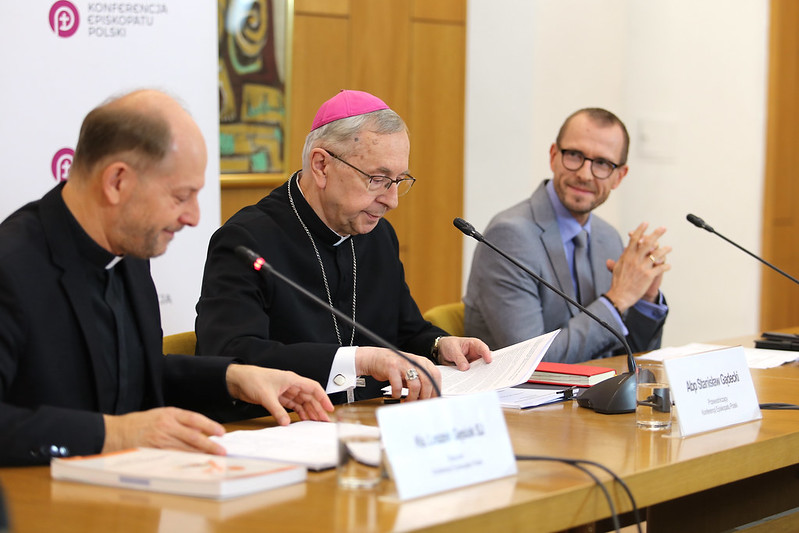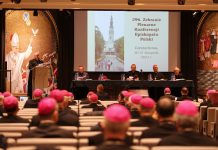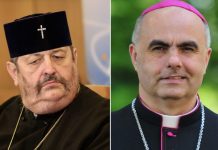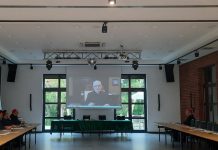“In the numerous statements communicated to the Synod Secretariat, we expressed our intention to preserve unity in the faith, convinced that while the pastoral practices in the world may differ due to the differences in civilisation, history, cultures, languages, and customs, the teaching of the Church must remain unified”, said Archbishop Stanisław Gądecki, President of the Polish Bishops’ Conference, during a press conference reviewing the first Roman session of the Sixteenth Ordinary General Assembly of the Synod of Bishops, held at the Secretariat of the Polish Bishops’ Conference on 8 November 2023.
President of the Polish Bishops’ Conference recalled that synodality was the principal subject of the Synod. It is “understood as a communion which unites all the disciples of the Risen Christ on a shared path, stressing the dignity, gifts, and charisms of each Catholic, offered by the Holy Spirit, for the sake of the missionary service of the Church”.
Archbishop Gądecki observed that during the 25 days of work of around 350 members of the synodal community, in its synthesis report the Secretariat indicated 20 core subjects. “Each of them indicates first convergences, then matters for consideration, and finally proposals for reflection. They are like a roadmap that helps us find our bearings and prevents us from losing our way. Discussion issues gather points where we concluded further theological, pastoral, and canonical studies are needed. They are the crossroads we must stop at to better grasp the direction to follow. Proposal, in turn, indicate possible avenues to follow. Some are suggested, other recommended, and still others are required with greater power and determination” – observed the archbishop.
“In the numerous statements communicated to the Synod Secretariat, we expressed our intention to preserve unity in the faith, convinced that while the pastoral practices in the world may differ due to the differences in civilisation, history, cultures, languages, and customs, the teaching of the Church must remain unified and cannot differ from one country to the next” – stressed President of the Polish Bishops’ Conference.
Referring to the German Synodal Way, Archbishop Gądecki said that “we responded to its 150-page text sent to all synodal fathers at the beginning of the October Synod by stressing its incompatibility with Catholic teaching, although at a press conference before the Holy Mass that concluded the Synod, Bishop Bätzing stated that all German demands had been met”.
President of the Polish Bishops’ Conference reported that some synodal themes touched on controversial issues such as the synodality of the Church, the hermeneutics of continuity or rupture, ideological colonisation, the alleged inadequacy of biblical anthropology, the role of the pastor in the Church, the question of priestly celibacy, the ordination of women, the deaconate for women, synodality and democracy, as well as gender and LGBT+ issues.
Archbishop Gądecki acknowledged that the very concept of inclusion presents a serious difficulty, according to many. “In the text of the Creed we profess our belief in ‘one, holy, catholic, and apostolic Church’. Universality must therefore characterise the evangelical mission of the Church sent to all peoples, to all persons regardless of their gender, nationality, and social status. However, in today’s understanding of the term, ‘inclusiveness’ implies an acceptance of how a person defines him or herself, as if defining oneself were in obvious conformity with reality, inherently unquestionable, and therefore demanding affirmation” – he stressed.
Referring to today’s woke culture, Archbishop Gądecki pointed out that it “seems to treat gender theory as a secular form of revealed truth”. “In fact, the theories of culturally constructed ‘gender’ and ‘gender fluidity’ stand in clear contradiction to divine revelation: ‘God created mankind in His image; in the image of God he created them: male and female he created them’ (Genesis 1:27). The above theories apply powerful cultural, professional, and legal pressure on those who refuse to compromise on the proper ordering of human love”, he assessed.
Archbishop Gądecki noted that it is the intention of the Synod Secretariat to continue discussing the proposals contained in the synthesis report called A Synodal Church in Mission. “This 43-page document was circulated to all the participants in the first synodal stage, and it is this document that is to become the subject of reflection for each Episcopal Conference of the world. Subsequently, it should be transmitted to each diocese so that in March 2024 the echoes of this reflection will reach the Synod Secretariat. We are therefore facing an intense time of discernment about what is right and what is not” – stressed Archbishop Gądecki.
Prof. Aleksander Bańka, a delegate for the Synod on Synodality noted that the concluding synthesis from the Roman session of the Synod is complex and tense: “The group of 360 delegates gather various local Churches with their representatives, each of them having their unique dynamism and history. The expectations of Western European Churches are out of step with the needs of Churches in other parts of the globe”.
Prof. Bańka indicated that the Synod is like a lens that gathers all kinds of tensions: “The synodal method, notwithstanding its deficiencies, helps to observe that individual local Churches and the entire communities behind them raise problems to which they apply a different perspective than we, in Eastern Europe; they likewise adopt other models of discernment and other ways of coping with the crises”.
The Synod delegate observed that we often differ as to our discernment and ways of solving particular issues. “The synodal method proposed by the Secretariat, notwithstanding its multiple ambiguities, helps us hear what those with whom we do not fully agree say about their Church”. He added that on the other hand, as for discrepancies, “I had the feeling that this Synod is not about doctrinal change”.
Prof. Bańka underlined that “the essence of the Synod is not to seek cracks in the doctrine. We would like the Synod to bear good fruit: the fruit of unity and integrity as well as a discovery of new paths of evangelisation and mission”.
Press Office of the Polish Bishops’ Conference
Translated by M. Turski / Office for Foreign Communication of the Polish Bishops’ Conference

 Polski
Polski







